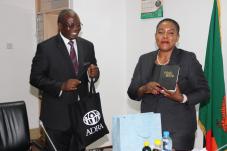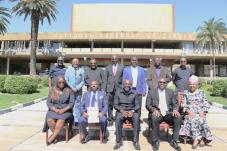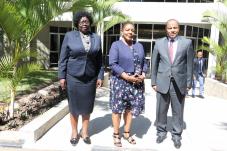- Home
- About Parliament
- Members
- Committees
- Publications
Speaker Matibini calls for promotion of inter-regional cooperation towards the achievement of more humane and smart migration
The Rt Hon Justice Dr Patrick Matibini, SC, MP, Speaker of the National Assembly of Zambia has called for the promotion of inter-regional cooperation towards the achievement of more humane and smart migration. Speaking when he delivered his statement during the general debate on strengthening the global regime for migrants and refugees, need for evidence policy solutions at the ongoing 138th IPU Assembly the Speaker said a good number of IPU resolutions had already been passed which should positively build upon the collective resolve of Parliamentarians to come up with proactive policy recommendations for the consideration of respective governments.
The Speaker noted the IPU 2014 resolution that addressed the urgent need to protect the rights of unoccupied migrant children as one of the determinants of the IPU in making a difference to the issue of migrants. In addition, the Speaker commended the continued collaboration of the IPU with the UNHCR.
Furthermore, the Speaker said that he was confident that the process towards the Global Compact for Safe Orderly and Regular Migration (GCM) and the Global Compact for Refugees (GCR) that has started would be concluded and signed off by the close of 2018.
At the same event, the Speaker said the burden for managing and caring for refugees has its greatest toll on the very countries that are economically too fragile to responsibly shoulder the added responsibility of caring for refugees. In addition, he said the plight of refugees and developmental challenges are increasingly intertwined. In view of this, the Speaker mentioned that the urgency to come up with a more human and effective Global migrants and refugees for Africa was not an option: it is imperative.
The Speaker highlighted the following four pointers towards arriving at evidence-based solutions for strengthening the Global regime for migrants and refugees:
- Explore how best migration, partially migration of refugees, could result into positive effects in terms of improving the socio-economic status of the migrants without unduly negatively affecting resident populations of the hosting countries
- Address how best to identify and manage the primary drivers of irregular migration with a view to ensuring that negative impacts on countries of origin are mitigated or minimized.
- How best to secure the human rights of migrants and refugees, guided by observance of non-discrimination principles and respect by local people through avoidance of negative stereotyping.
- Recognizing the disadvantage position of particular groups, there is urgency for affirmative action that addresses the special needs and requirements of women, children and the aged considering that they are often at risk of discrimination and abuse
Considering that the current global regime is proving to be inadequate to address the various complex dimensions of the plight of migrant and refugees, the Speaker said the political resolve founded on human rights principles is needed now more than before.





